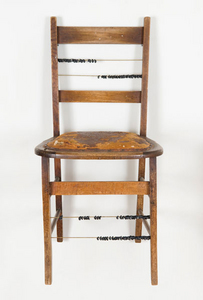Head count
Gough, Julie (2008) Head count. [Creative Work]
![[img]](https://researchonline.jcu.edu.au/19600/1.hassmallThumbnailVersion/19600_Gough_2008_Head_count.jpg)
|
Image (JPEG) (Published Version)
- Published Version
Download (95kB) |
|
|
PDF (Invitation)
- Supplemental Material
Download (121kB) |
Abstract
Fugitive History presents recent artworks about historic Tasmanian places and associated stories that are often concealed from the mainstream or everyday. These works gather together as trace evidence of what came before, what happened here. My aim is to offer for fresh reconsideration aspects of cryptic or unresolved histories that bring us to the point of dim memory. These objects and the repetitive actions that created them aim to trigger a rhythmic form of remembering of this island's colonial-contact inheritance. Collections of objects: spears, shelves, chairs, pins, coal, shells, wallpapers, people and place names manifest in multiple my entrapment in the challengingly elusive past. The objects that make this exhibition: spears, strung shells on wire, coal on rope, antlers, chairs, books represent my own and my family's patience, our waiting for our different, darker, Indigenous past to be rendered. The works stir between the absences in the records and our presence in places and with people from the early 1800s that were not only tribal or remote.
Research Statement
| Research Background | In March 2008 a body of seventeen new artworks were exhibited in my first post-tertiary solo exhibition in Tasmania, about Tasmania. This exhibition was the result of dedicated archival investigation and exploration of mediums, scale, techniques to determine how to successfully transform often obscure historic and archival based text into accessible visual art without losing the inherent narrative which gave the original accounts their traction - connections between place and people in the past. |
|---|---|
| Research Contribution | Fugitive History contributed to an increased understanding of the extent of cross-cultural relations between Indigenous and non Indigenous people in Tasmania in the first half of the nineteenth century. Each work focused on a particular area of contact eg: accessing land, naming people and properties, witnessing crimes, removal of children, counting the dead. The research contribution of these works is primarily to the field of cross-cultural studies and visual arts in Australia and to a broad national and international audience which is most evident by the acquisition of seven works by public institutions (eg three acquired by National Gallery) where they will remain in the public sphere of art discourse and cross-cultural studies into the future. |
| Research Significance | The primary research significance is its part in supporting the continuing enquiry into the purpose and presentation of history in Australia. Fugitive History was my first instance of testing the ground for making non-mainstream history accessible within a commercial gallery space. The positive reception to the exhibition has led to further opportunities in making work that similarly interrogate the past. |
| Item ID: | 19600 |
| Item Type: | Creative Work |
| Media of Output: | Found chair with brass rods & black crow shells |
| Event Details: |
Fugitive History Bett Gallery, Hobart, TAS, Australia 11 March – 8 April 2008 |
| Keywords: | Aboriginal, Australian, Indigenous, art, sculpture, colonisation, cross-cultural, mixed-media |
| Related URLs: |
|
| Additional Information: | This work was included in "Fugitive History" exhibition at Bett Gallery, Hobart, 11 March - 8 April 2008. The exhibition and other works included in this exhibition are available from the Related URLs field. |
| Date Deposited: | 16 Jan 2012 00:07 |
| FoR Codes: | 19 STUDIES IN CREATIVE ARTS AND WRITING > 1905 Visual Arts and Crafts > 190502 Fine Arts (incl Sculpture and Painting) @ 100% |
| SEO Codes: | 95 CULTURAL UNDERSTANDING > 9501 Arts and Leisure > 950104 The Creative Arts (incl. Graphics and Craft) @ 100% |
| Downloads: |
Total: 212 Last 12 Months: 9 |
| More Statistics |



